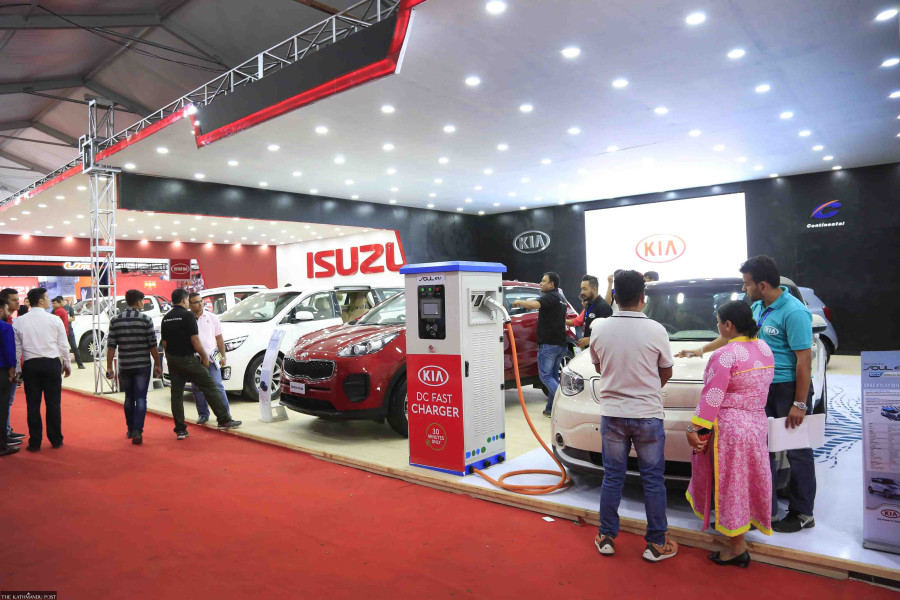Money
India tax exemptions may make EVs cheaper in Nepal
The Indian government has waived taxes on several inputs through the budget for the fiscal year 2023-24.
Krishana Prasain
If you are thinking of buying an Indian electric vehicle or cell phone this year, you are in luck. Prices of battery-operated vehicles and mobile sets made in India are expected to drop as the Indian government has eliminated import taxes on certain products used in their manufacture.
In a bid to promote exports, boost domestic manufacturing and enhance domestic value addition, the Indian government has waived taxes on several inputs through the budget for the fiscal year 2023-24.
Nepali traders say that tax exemptions in India could bring down prices of many Indian goods in Nepal.
Indian Finance Minister Nirmala Sitharaman presented the budget in Parliament on Wednesday. The financial year in India begins on April 1.
The Indian budget has announced providing relief in customs duty on the import of certain parts and inputs like camera lenses and continuing the concessional duty on lithium-ion batteries for another year.
The customs duty on the camera lens and inputs and parts for use in the manufacture of the camera module of cellular mobile phones has been reduced to zero from 2.5 percent.
According to Finance Minister Sitharaman, mobile phone production in India has increased from 58 million units worth Rs302.4 billion in 2014-15 to 310 million units worth Rs4.4 trillion in the last financial year as a result of various initiatives of the Indian government.
“The Indian government's move to boost domestic manufacturing and export will definitely reduce the price of mobile phones in Nepal,” said Sanjay Agrawal, vice-president of the Mobile Importers Association.
He said that if mobile phones manufactured in India become cheaper than Chinese sets, this may increase the grey market of mobile phones in Nepal.
The Nepal Telecommunications Authority's plan for full-fledged implementation of the Mobile Device Management System from December 30 last year was abandoned after Prime Minister Pushpa Kamal Dahal ordered it not to launch the system immediately amid public criticism.
India imports nearly 98 percent of the parts used to manufacture mobile phones from China. “The reduction in customs duty on import of such parts will reduce the cost of production and bring down the price of mobiles," said Agrawal.
Samsung, MI and Realme are the popular mobile brands from India. Chinese phones are also assembled in India.
According to the Department of Customs, Nepal imported 637,648 smart phones worth Rs8.94 billion from China in the first six months of the current fiscal year ended mid-January, compared to 250,261 units worth Rs3.59 billion from India during the same period.
According to the 2023-24 Indian budget, customs duty exemption has been extended to import of capital goods and machinery required for manufacture of lithium-ion cells for batteries used in electric vehicles as part of the green mobility drive.
Dhruba Thapa, president of the Nepal Automobile Dealers Association, said that the tax exemptions provided by the Indian government will likely make Indian electric vehicles cheaper in Nepal.
“If the production cost of electric vehicles falls in India, it is possible that the price of electric cars will come down,” Thapa said.
"But it will take some time for Nepali customers to get electric vehicles at reduced rates as a new lot of vehicles have to be produced first," he said.
“I cannot say right now by what percentage the price of electric vehicles imported from India will come down,” Thapa said.
According to the Department of Customs, Nepal imported 1,280 electric cars worth Rs3.46 billion from India in the first six months of the current fiscal year compared to 237 electric cars worth Rs554.81 million from China during the same period.
As per the Indian budget for the fiscal year 2023-24, in order to promote the growth of manufacturing in the cooperative sector, a new co-operative society is proposed to be allowed an option to pay tax at a concessional rate of 15 percent similar to what is available to new manufacturing companies.
To facilitate availability of raw materials for the steel sector, exemption from Basic Customs Duty on raw materials for manufacture of CRGO Steel, ferrous scrap and nickel cathode is being continued, as per the Indian budget.
The concessional basic customs duty of 2.5 percent on copper scrap is also being continued to ensure the availability of raw materials for secondary copper producers who are mainly in the micro, small and medium enterprises sector.
The Indian budget has also announced a hike in the basic customs duty rate on compounded rubber from 10 percent to 25 percent or IRs 30 per kg, whichever is lower, at par with that on natural rubber other than latex, to curb circumvention of duty.




 8.54°C Kathmandu
8.54°C Kathmandu














